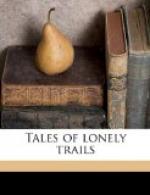As I became better acquainted with Takahashi I learned to think more of the Japanese. I studied Takahashi very earnestly and I grew to like him. The Orientals are mystics and hard to understand. But any one could see that here was a Japanese who was a real man. I never saw him idle. He resented being told what to do, and after my first offense in this regard I never gave him another order. He was a wonderful cook. It pleased his vanity to see how good an appetite I always had. When I would hail him: “George, what you got to eat?” he would grin and reply: “Aw, turkee!” Then I would let out a yell, for I never in my life tasted anything so good as the roast wild turkey Takahashi served us. Or he would say: “Pan-cakes—apple dumplings—rice puddings.” No one but the Japs know how to cook rice. I asked him how he cooked rice over an open fire and he said: “I know how hot—when done.” Takahashi must have possessed an uncanny knowledge of the effects of heat. How swift, clean, efficient and saving he was! He never wasted anything. In these days of American prodigality a frugal cook like Takahashi was a revelation. Seldom are the real producers of food ever wasters. Takahashi’s ambition was to be a rancher in California. I learned many things about him. In summer he went to the Imperial Valley where he picked and packed cantaloupes. He could stand the intense heat. He was an expert. He commanded the highest wage. Then he was a raisin-picker, which for him was another art. He had accumulated a little fortune and knew how to save his money. He would have been a millionaire in Japan, but he intended to live in the United States.
Takahashi had that best of traits—generosity. Whenever he made pie or cake or doughnuts he always saved his share for me to have for my lunch next day. No use to try to break him of this kindly habit! He was keen too, and held in particular disfavor any one who picked out the best portions of turkey or meat. “No like that,” he would say; and I heartily agreed with him. Life in the open brought out the little miserable traits of human nature, of which no one was absolutely free.
I admired Takahashi’s cooking, I admired the enormous pile of firewood he always had chopped, I admired his generosity; but most of all I liked his cheerfulness and good humor. He grew to be a joy to me. We had some pop corn which we sometimes popped over the camp-fire. He was fond of it and he said: “You eat all time—much pop corn—just so long you keep mouth going all same like horse—you happy.” We were troubled a good deal by skunks. Now some skunks were not bad neighbors, but others were disgusting and dangerous. The hog-nosed skunk, according to westerners, very often had hydrophobia and would bite a sleeper. I knew of several men dying of rabies from this bite. Copple said he had been awakened twice at night by skunks biting the noses of his companions in camp. Copple had to choke




